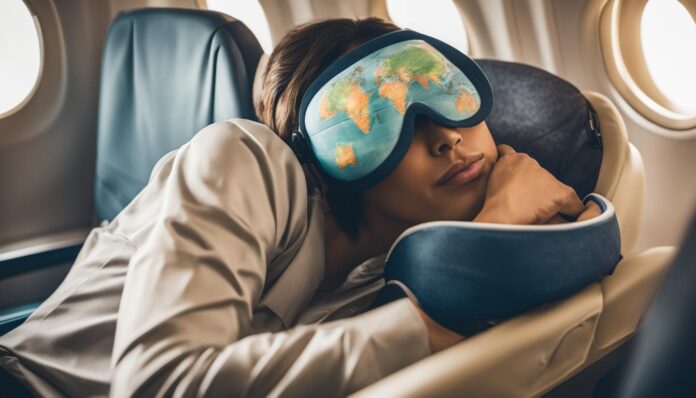When traveling long distances by plane, jet lag can be a frustrating and exhausting experience. Symptoms like fatigue, headaches, and insomnia can put a damper on your travel experience. However, by implementing the following tips, you can learn how to avoid jet lag when traveling long distances by plane and minimize its impact.
Discover effective jet lag prevention techniques, including natural remedies for jet lag and helpful tips to prevent jet lag. Adjusting your sleep schedule, syncing with the new time zone, utilizing natural remedies, maintaining healthy habits during the flight, considering melatonin supplements, and regulating your exposure to light are some of the many tips that you’ll find in this article. Follow them to ensure that you arrive at your destination feeling refreshed and ready to enjoy your trip.
Understand Jet Lag and its Symptoms
Jet lag is a common condition that affects many travelers who cross multiple time zones. It occurs when your internal clock, also known as the circadian rhythm, is disrupted, causing you to feel out of sync with the local time of your destination.
The most common symptoms of jet lag include:
- Fatigue: Feeling tired and lethargic
- Insomnia: Difficulty falling or staying asleep
- Headaches: Throbbing pain in the head
- Irritability: Feeling grumpy or moody
- Difficulty concentrating: Problems with memory and focus
- Stomach problems: Nausea, constipation, or diarrhea
It’s important to recognize these symptoms and take steps to prevent jet lag from disrupting your travel plans. The severity of jet lag symptoms can vary depending on factors such as the number of time zones crossed and your individual sleep patterns.
Adjust Your Sleep Schedule Before Traveling
Adjusting your sleep schedule before traveling long distances can help minimize the impact of jet lag on your body. Here are some tips to help you modify your sleep routine prior to your trip:
- Start a few days before your trip: Gradually adjust your bedtime and waking time by 30-60 minutes each day, depending on the time zone of your destination.
- Expose yourself to sunlight: Spend time outside during daylight hours to help reset your body’s natural rhythm. Alternatively, use light therapy if natural light is not available.
- Shift your meals: Gradually shift your meal schedule to match the time zone of your destination.
- Avoid sleep disturbances: Try to maintain a regular sleep routine and avoid disruptions such as napping during the day or consuming excessive caffeine or alcohol in the evening.
By making these adjustments, you can help your body start adjusting to the new time zone before you even leave home, making the transition smoother and minimizing the effects of jet lag.
Sync with the New Time Zone While on the Plane
Adjusting your sleep patterns to the new time zone during the flight can significantly reduce the effects of jet lag. Here are some tips to help you sync with the new time zone while on the plane:
- Set your watch to the destination time zone: By mentally preparing for the new time zone, you can adjust your sleep schedule accordingly and start resetting your body clock on the flight.
- Stay hydrated: Drink plenty of water to stay hydrated and help your body adjust to the new time zone. Avoid alcohol and caffeine, as they can cause dehydration and disrupt your sleep.
- Expose yourself to light: Bright light exposure is a powerful tool for regulating your body clock. Try to expose yourself to natural light or use a light therapy device to help reset your circadian rhythm.
- Take naps: Take brief naps during the flight to help regulate your sleep cycle and stay alert upon arrival. Use a comfortable eye mask and earplugs or noise-cancelling headphones to block out light and noise and help you sleep.
By following these techniques, you can gradually adjust your sleep patterns to the new time zone and minimize the impact of jet lag during the flight.
Utilize Natural Remedies for Jet Lag
Jet lag can be a real hassle when traveling long distances by plane, disrupting your sleep patterns and leaving you feeling groggy and fatigued. Fortunately, natural remedies can help alleviate jet lag symptoms and promote better sleep during and after your flight. Here are some effective ways to ease the effects of jet lag using natural remedies:
1. Chamomile Tea
Chamomile tea is a relaxing and natural sleep aid that can help promote restful sleep and reduce anxiety. A cup of chamomile tea before bed may help you fall asleep faster and stay asleep longer, reducing the effects of jet lag on your body.
2. Lavender Essential Oil
Lavender essential oil is known for its calming and soothing properties, promoting relaxation and improving sleep quality. Apply a few drops of lavender oil to your pillow or use a diffuser in your hotel room to promote restful sleep and alleviate jet lag symptoms.
3. Melatonin
Melatonin is a hormone naturally produced by the body that regulates sleep and wake cycles. Taking a low dose of melatonin supplements can help adjust your sleep patterns and reduce jet lag symptoms. It’s important to consult with your doctor before taking melatonin supplements, especially if you have an existing medical condition or are taking other medications.
4. Magnesium Supplements
Magnesium is a mineral that supports healthy sleep by regulating neurotransmitters and calming the nervous system. Taking magnesium supplements before bed can help improve sleep quality and reduce the impact of jet lag on your body.
Note: Before trying any natural remedies, it’s important to consult with your doctor to ensure they are safe for you to use and won’t interact with any medications you may be taking.
Maintain Healthy Habits During the Flight
Long flights can be tough on your body, but adopting healthy habits can help reduce the impact of jet lag and improve your overall travel experience. Here are some tips to help you maintain healthy habits during the flight:
Stay Hydrated
Drinking plenty of water during the flight is crucial to combat dehydration and fatigue. Remember to avoid alcoholic or caffeinated beverages, as they can increase dehydration and disrupt your sleep patterns. Instead, opt for water or herbal tea.
Pack Healthy Snacks
Bringing your own healthy snacks can help you avoid the temptation of processed or unhealthy airplane food. Pack some fruits, nuts, or granola bars to keep you satiated and energized throughout the flight.
Move Your Body
Sitting for long periods can lead to stiff muscles and cramps. Take short walks around the cabin or do some simple exercises, like stretching or yoga poses, to keep your body active and prevent blood clots.
Get Some Rest
Getting enough rest during the flight is essential to minimizing jet lag symptoms once you arrive at your destination. Use a neck pillow, bring an eye mask and earplugs, and adjust your seat to a comfortable position to help you sleep better.
Avoid Germ Hotspots
Airplanes can be a breeding ground for germs, making it crucial to take precautions to avoid getting sick. Avoid touching your face, sanitize your hands frequently, and use a disinfectant wipe to clean your tray table, armrests, and other surfaces around your seat.
Consider Melatonin Supplements for Jet Lag
If you’re struggling to reset your sleep-wake cycle, taking melatonin supplements may be a natural solution to help alleviate jet lag symptoms. Melatonin is a hormone that regulates sleep and wakefulness, and its production shifts in response to changes in light and dark. Supplementation with melatonin can help signal the body to adjust to the new time zone, promoting healthy sleep and reducing the effects of jet lag.
It’s essential to note that melatonin supplements should not be used as a permanent solution for sleep problems, and they don’t work for everyone. However, when taken correctly, they can be a useful aid in promoting healthy sleep habits.
It’s recommended to take melatonin supplements 30 minutes to an hour before sleep, and in the new time zone. If you’re traveling east, take it in the morning, while traveling west, take it in the evening.
When selecting a melatonin supplement, ensure that you purchase it from a reputable brand and follow dosage directions carefully. As with any supplement, consult with your healthcare provider before starting to take melatonin to minimize any potential side effects.
The Benefits of Melatonin Supplements for Jet Lag
| Benefits | How It Helps |
|---|---|
| Improves sleep quality | Melatonin supplementation helps signal the body to rest, leading to a more restful sleep that can help to reduce jet lag symptoms. |
| Alleviates jet lag symptoms | Melatonin supplements help to reset the sleep-wake cycle, minimize the effects of jet lag, and promote healthy sleep habits. |
| Natural sleep aid | Melatonin is a natural hormone produced in the body, making it a natural sleep aid that can be beneficial for those struggling with sleep while traveling. |
Regulate Your Exposure to Light
Light exposure is a crucial factor affecting your circadian rhythm, which controls your sleep and wake cycles. By regulating exposure to light during your trip, you can help reset your body clock and reduce the symptoms of jet lag.
During your flight, consider using a sleep mask and reducing screen time to reduce exposure to light. You can also try exposing yourself to light at appropriate times to realign your body clock. If you’re flying east, try exposing yourself to bright light in the morning hours, while westward travelers should seek light in the afternoon and evening.
Upon arrival, try to spend time outdoors during daylight hours to help your body adjust to the new time zone. At night, minimize exposure to light by using blackout curtains or eye masks to help promote sleep.
Conclusion
Long flights can be exhausting, but jet lag doesn’t have to ruin your travel experience. By implementing the tips and strategies discussed in this article, you can significantly reduce the impact of jet lag when traveling long distances by plane. Remember to adjust your sleep schedule before traveling, sync with the new time zone while on the plane, and utilize natural remedies such as herbal supplements and relaxation techniques to promote better sleep. Practicing healthy habits such as staying hydrated, eating properly, and exercising during the flight can also help minimize jet lag symptoms. Consider melatonin supplements to help regulate your sleep patterns and adjust to different time zones. Finally, regulate your exposure to light to reset your circadian rhythm and promote better sleep. With these tips in mind, you can arrive at your destination feeling refreshed and ready to enjoy your trip.

















































